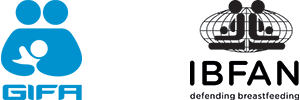
In May 2017, delegates from IBFAN-GIFA, Baby Milk Action/IBFAN UK and FIAN International advocated under IBFAN accreditation for increased corporate accountability and effective safeguards against the undue corporate influence in global health governance at the 70th World Health Assembly held in Geneva.
In its statement on response to emergencies, IBFAN noted that emergencies are prime opportunities for commercial exploitation and for those whose main purpose is the expansion of the ‘Business of Malnutrition’ through unsolicited donations of breastmilk substitutes and baby food products. We also recalled that the WHO’s role is norm-setting rather than operational – promoting prevention and emergency preparedness protocols that will improve food security in the long term, helping to reverse this situation and improve public health generally. Read the full statement
In relation with noncommunicable diseases, IBFAN and FIAN International have expressed their concerns about WHO Global Coordinating Mechanism on the Prevention and Control of NCDs which gives disproportionate promotion to corporations that not only promote unhealthy foods, but are involved in land-grabbing, mono-cropping – undermining access to bio-diverse wholesome foods and environmental resources. Read the full statement
IBFAN and FIAN International and PHM commented on the biennial outcome report of the Second International Conference on Nutrition, highlighting among other issues the need for the work programme of the Decade of Action on Nutrition to comply with the human rights framework and guarantee access to effective and timely remedies for victims, to include promotion and protection of women’s rights as crosscutting elements of all areas of intervention and to ensure that trade and investment agreements do not harm human rights using Investor State Dispute Settlement mechanisms. Read the full statement
IBFAN and FIAN International also commented on the implementation plan of the Commission on Ending Childhood Obesity, expressing their satisfaction to see that many IBFAN comments to the draft plan were taken into account and recalling that breastfeeding constitutes a human right. States therefore have the obligation to provide mothers with accurate and unbiased information and counseling from the start of their pregnancy, including on the continuation of breastfeeding up to 2 years or beyond. IBFAN and FIAN International regretted that this key factor was not mentioned in the plan and noted that the Baby Friendly Hospital Initiative should be mentioned as the external audit that guarantees implementation of the Ten Steps to Successful Breastfeeding. IBFAN and FIAN International finally also called States to provide mothers with a minimum of 6 months of maternity leave and warned States against corporations investing in « nutrition education ». Read the full statement
IBFAN and FIAN International finally shared their concerns about the Framework for Engagement with Non State Actors (FENSA) and its ill-definition of terms such as ‘partnership’ ‘stake-holder’ and ‘trust’ which allows corporations and philanthropies to claim the right to participate and shape public health decision-making processes, side-lining governments, the UN and peoples’ human rights. IBFAN and FIAN International also emphasized the Gates Foundation application for Official Relations was a test of FENSA’s thoroughness which could and should have provided clarity on the relationship between WHO and the Foundation. Indeed, this point is crucial as the engagement of the Gates Foundation might have an influence on WHO’s nutrition policy setting. Read the full statement
